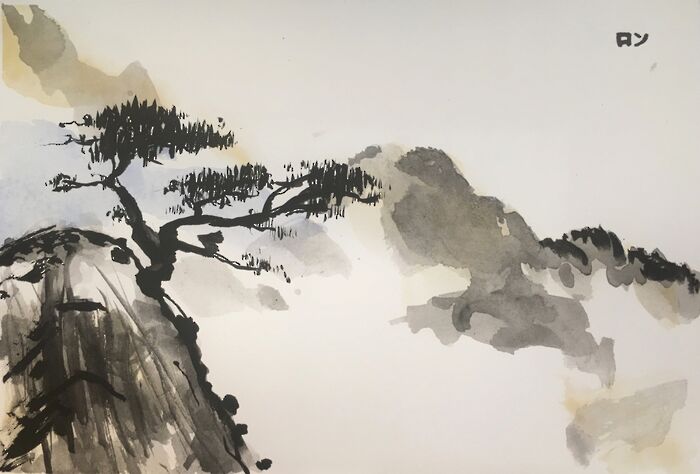Interview: Dr James Fox
Peter Chappell talks to the BBC art historian and Caius fellow James Fox about Japanese art and playing squash with Will from The Inbetweeners
How James Fox got into television sounds like the opening of a spy thriller. “I got an email out of the blue from the commissioning editor for Arts at the BBC,” he says, with an air of feigned bemusement. “He just wrote, ‘Hi James, hope all’s well, would you like to come in for a meeting at the BBC.’ I wrote back saying ‘sure’, not knowing what this was about. So I went for the meeting, all the way to White City. I met with Mark; ‘Well you know why you’re here?’ ‘No, I have no idea’, I replied. ‘Your students wrote a letter to me about a year ago’, said Mark, ‘and its only just come to my attention. They said you might be good on television.’”
The students’ suspicions proved correct. The 30-something Cambridge art historian (or, in the words of Mark, a “young, arts person”) and Caius Fellow has gone on to write and present popular arts programmes including A History of Art in Three Colours, Bright Lights, Brilliant Minds, and, most recently, The Art of Japanese Life. I paid him a visit at his flat near Sidgwick Avenue in torrid mid-July, only too eager to escape the open day I was helping with at Downing and the pressing questions from nosy mothers. I was wearing a hot pink ‘How Can I Help?’ T-shirt. I sat down on his antique couch, feeling conspicuous.
How can living be an art form? This knotty question occupies Fox’s work in Japan. “That distinction between what is art with a capital ‘A’ and what is just other aspects of culture and life doesn’t really exist at all. Generally in my work I like to think of art in a broader domain, something which cultures do to make meaning of their lives, to entertain themselves, to decorate their environments.”
His apartment is certainly testament to his belief in the beauty of the domestic; an antique piano inhabits a corner of the parquet floor, 20th century oil paintings are dappled with sunlight from the garden. He continues: “When you go to Japan, you see there is artfulness and aesthetic considerations in all kinds of activity. And there is just as much thought put into things we wouldn’t typically think of, like designing a pen for instance, as there would be in painting a picture.”
“Minimalism, restraint, exotic elegance. These Western labels typify our understanding of Japanese art”
Minimalism, restraint, exotic elegance. These Western labels typify our understanding of Japanese art. Fox says this isn’t quite the whole picture: “When you travel around Japan, you don’t see much of this myth of Japan; lots of Japan is really quite ugly. Cities are really ugly, there’s not much urban planning, there are exposed cables everywhere, everything is a big old mess.”
In the programme, Fox talks to Daido Moriyama, a photographer who has documented post-war challenges to traditional Japanese culture. Many stereotypes about Japanese art still exist: “It’s a very challenging thing to reconcile the messiness of so much of Japanese life, and yet the obsession with attention to detail and the tidiness of other parts of Japanese life.” At the same time, Fox is aware of his BBC audience: “You want to inspire viewers, you want viewers to see the beautiful things, you want to satisfy viewer expectations. A lot of viewers jump to a programme like that, thinking, ‘here we go, ikebana, beautiful interiors’, but you have to also just nudge them beyond what those expectations might be.”
Many hard-up academics dream of making it as a ‘telly-don’, but not all can write and perform in the distinct registers demanded for TV and for academia. A presenting role requires clarity, charisma, and an unpretentious turn of phrase. “It’s a challenge to do well”, Fox admits. “When I’m writing academic papers, I’m writing for small readerships. They’re a captive audience.” Yet, he says, it’s a different kettle of fish with TV: “You are constantly fighting a battle against other television programmes which are on at the same time, you are fighting against indifference, against the fact a lot of people would switch on a programme, and it’s so easy for them to switch over. In a lecture hall it’s quite difficult to walk out if you’re bored after a minute!”
Fox’s apparent commitment to the suit (black, skinny) has become a trademark of his programmes. Whether it’s the North African desert, Venice, or New York, the uniform is the same. In Japan this time around, it looked very hot. “I don’t want to wear the suit! I fight having to wear the suit”, he laughs, “I started wearing it five years ago for a programme called A History of Art in Five Colours, where we were doing a sequence at NASA in Texas. So I had to go into mission control, and I was meant to walk around intercut with archive footage from the 60’s. The archive footage was almost entirely men wearing black suits with thick black ties. It was the first thing we shot, and the director said ‘why don’t you wear it for that, and it really would be very clever for us to visually rhyme the two things’.” The decision stuck.
The interview ended with me wondering which life Fox preferred, the presenter or the art historian. Does he enjoy being a bit famous? “A small amount. I’ve got some friends who were with me at Cambridge who are really famous. Eddie Redmayne did History of Art with me.” “Who’s he?” I joke. “A big star”, he says, getting up from his chair, “Also Dan Stevens, from Downton Abbey. My squash partner is Simon Bird, who was in The Inbetweeeners. We play squash pretty much every day if we can, and he can’t walk 20 metres without someone asking him for an autograph!” Maybe Fox should have written puerile sitcoms instead? “Maybe. Maybe thats what I should have done”
 News / Cambridge launches plan to bridge ‘town and gown’ divide27 October 2025
News / Cambridge launches plan to bridge ‘town and gown’ divide27 October 2025 Arts / Reflections on the Booker Prize 202528 October 2025
Arts / Reflections on the Booker Prize 202528 October 2025 News / SU referendums heat up as campaigners claim intervention29 October 2025
News / SU referendums heat up as campaigners claim intervention29 October 2025 News / SU announces vote on NUS affiliation17 October 2025
News / SU announces vote on NUS affiliation17 October 2025 Film & TV / Finding space in Cambridge for the love of filmmaking29 October 2025
Film & TV / Finding space in Cambridge for the love of filmmaking29 October 2025










